闽教版小学英语五年级下册知识点56688doc资料
闽教版小学英语五下Unit 1 单元知识点梳理

闽教版小学英语五年级下册单元知识梳理Unit 1 Winter Vacation(寒假)单词(音标为英式音标)was [wəz] am, is的过去式were [wə(r)] are的过去式China [ˈtʃaɪnə] 中国went [went] go的过去式parent [ˈpeərənt] 父,母;家长hometown [ˈhəʊmtaʊn] 故乡took [tʊk] take的过去式tour [tʊə(r)] 旅行;旅游Sun Moon Lake 日月潭lake [leɪk] 湖did [dɪd] do的过去式swam [swæm] swim的过去式◆单元学习目标1.能准确使用动词的过去式讲述过去发生的事情。
2.能用英语说一说自己的寒假生活。
3.能用英语说一说、写一写自己的故乡。
动词过去式的构成:(1)规则动词过去式的构成有四条规则:①一般在动词原形末尾直接加上-ed。
如:look—looked,visit—visited,watch—watched。
②以不发音的字母e结尾的动词,只需加-d。
如:live—lived。
③末尾只有一个辅音字母的重读闭音节,先双写这个辅音字母,再加ed。
如:stop—stopped。
④末尾是“辅音字母+y”结尾的动词,先改y为i,然后再加-ed。
如:study—studied。
(2)不规则动词的过去式需要记忆。
如:am/is—was,are—were,go—went,come—came,take—took,have(has)—had等。
◆拓展学习了解我国与澳大利亚不同的地理位置及气候情况。
了解台湾的一些著名的风景名胜。
宝岛台湾自古以来就是中国领土不可分割的一部分。
Part A重点句型及词组(1)How was your winter vacation?你的寒假过得怎么样?-- It was wonderful. I visited the Great Wall.很精彩。
五年级下册英语素材知识点 闽教版-教学文档
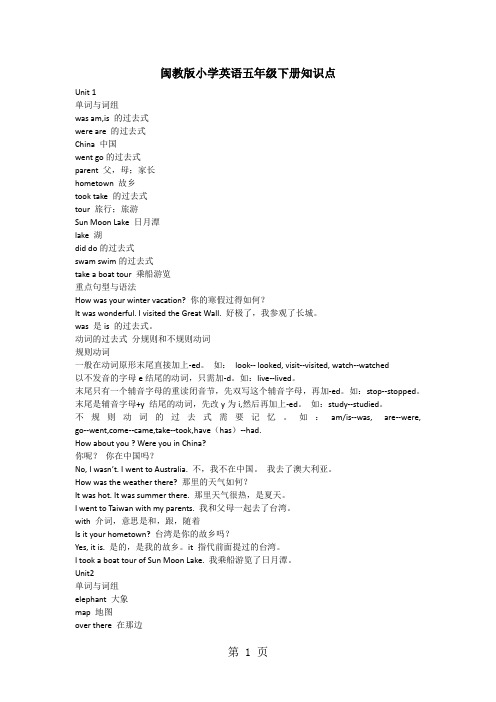
闽教版小学英语五年级下册知识点Unit 1单词与词组was am,is 的过去式were are 的过去式China 中国went go的过去式parent 父,母;家长hometown 故乡took take 的过去式tour 旅行;旅游Sun Moon Lake 日月潭lake 湖did do的过去式swam swim的过去式take a boat tour 乘船游览重点句型与语法How was your winter vacation? 你的寒假过得如何?It was wonderful. I visited the Great Wall. 好极了,我参观了长城。
was 是is 的过去式。
动词的过去式分规则和不规则动词规则动词一般在动词原形末尾直接加上-ed。
如:look-- looked, visit--visited, watch--watched以不发音的字母e结尾的动词,只需加-d。
如:live--lived。
末尾只有一个辅音字母的重读闭音节,先双写这个辅音字母,再加-ed。
如:stop--stopped。
末尾是辅音字母+y 结尾的动词,先改y为i,然后再加上-ed。
如:study--studied。
不规则动词的过去式需要记忆。
如:am/is--was, are--were, go--went,come--came,take--took,have(has)--had.How about you ? Were you in China?你呢?你在中国吗?No, I wasn’t. I went to Australia. 不,我不在中国。
我去了澳大利亚。
How was the weather there? 那里的天气如何?It was hot. It was summer there. 那里天气很热,是夏天。
I went to Taiwan with my parents. 我和父母一起去了台湾。
五年级下册英语素材知识点 闽教版
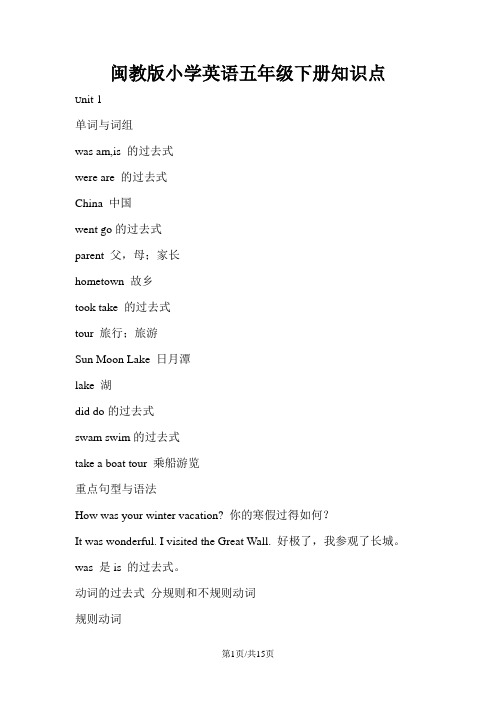
闽教版小学英语五年级下册知识点U nit 1单词与词组was am,is 的过去式were are 的过去式China 中国went go的过去式parent 父,母;家长hometown 故乡took take 的过去式tour 旅行;旅游Sun Moon Lake 日月潭lake 湖did do的过去式swam swim的过去式take a boat tour 乘船游览重点句型与语法How was your winter vacation? 你的寒假过得如何?It was wonderful. I visited the Great Wall. 好极了,我参观了长城。
was 是is 的过去式。
动词的过去式分规则和不规则动词规则动词一般在动词原形末尾直接加上-ed。
如:look-- looked, visit--visited, watch--watched以不发音的字母e结尾的动词,只需加-d。
如:live--lived。
末尾只有一个辅音字母的重读闭音节,先双写这个辅音字母,再加-ed。
如:stop--stopped。
末尾是辅音字母+y 结尾的动词,先改y为i,然后再加上-ed。
如:study--studied。
不规则动词的过去式需要记忆。
如:am/is--was, are--were, go--went,come--came,take--took,have(has)--had.How about you ? Were you in China?你呢?你在中国吗?No, I wasn’t. I went to Australia. 不,我不在中国。
我去了澳大利亚。
How was the weather there? 那里的天气如何?It was hot. It was summer there. 那里天气很热,是夏天。
I went to Taiwan with my parents. 我和父母一起去了台湾。
闽教版小学英语五年级下册总复习各单元知识点

闽教版小学英语五年级下册总复习各单元知识点Unit 1 Winter Vacation(寒假)Hi, Lily. How was your winter vacation?你好,莉莉。
你的寒假过得怎么样?It was wonderful. I visited the Great Wall. 很精彩。
我参观了长城。
How about you?Were you in China? 你呢?你寒假有在中国吗?No, I wasn’t. I went to Australia. 不,没有。
我去了澳大利亚。
How was the weather there? 那的天气怎么样?It was hot. It was summer there. 很热。
那里是夏天。
巩固练习A: How was your winter vacation? 你的寒假过得怎么样?B: It was wonderful.I visited the Great Wall. 我参观了长城。
I went to Australia. 我去了澳大利亚。
I visited the museum. 我参观了博物馆。
I watched TV. 我看了电视。
Hi, boys and girls! 嗨,孩子们!Hi, Miss Gao. 嗨,高老师。
How was your winter vacation? 你们的寒假过得怎么样?I went to Taiwan with my parents. 我和父母去了台湾。
Is it your hometown?那里是你的故乡吗?Yes, it is. 是的,台湾是我的故乡。
I took a boat tour of Sun Moon Lake. 我乘船游览了日月潭。
How about you, Yang Ming? 你呢,杨明?I played chess with my father. 我和爸爸下了棋。
Who was the winner? 谁赢了?Very often my dad was the winner. 经常是我的爸爸赢。
闽教版小学英语五年级下册知识点 (2)
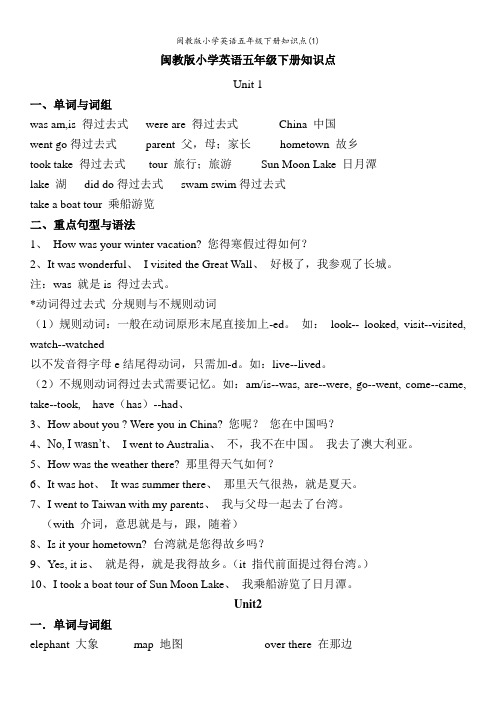
闽教版小学英语五年级下册知识点Unit 1一、单词与词组was am,is 得过去式were are 得过去式China 中国went go得过去式parent 父,母;家长hometown 故乡took take 得过去式tour 旅行;旅游Sun Moon Lake 日月潭lake 湖did do得过去式swam swim得过去式take a boat tour 乘船游览二、重点句型与语法1、How was your winter vacation? 您得寒假过得如何?2、It was wonderful、I visited the Great Wall、好极了,我参观了长城。
注:was 就是is 得过去式。
*动词得过去式分规则与不规则动词(1)规则动词:一般在动词原形末尾直接加上-ed。
如:look-- looked, visit--visited, watch--watched以不发音得字母e结尾得动词,只需加-d。
如:live--lived。
(2)不规则动词得过去式需要记忆。
如:am/is--was, are--were, go--went, come--came, take--took, have(has)--had、3、How about you ? Were you in China? 您呢?您在中国吗?4、No, I wasn’t、I went to Australia、不,我不在中国。
我去了澳大利亚。
5、How was the weather there? 那里得天气如何?6、It was hot、It was summer there、那里天气很热,就是夏天。
7、I went to Taiwan with my parents、我与父母一起去了台湾。
(with 介词,意思就是与,跟,随着)8、Is it your hometown? 台湾就是您得故乡吗?9、Yes, it is、就是得,就是我得故乡。
闽教版英语五年级下册(1-4)重点内容归纳
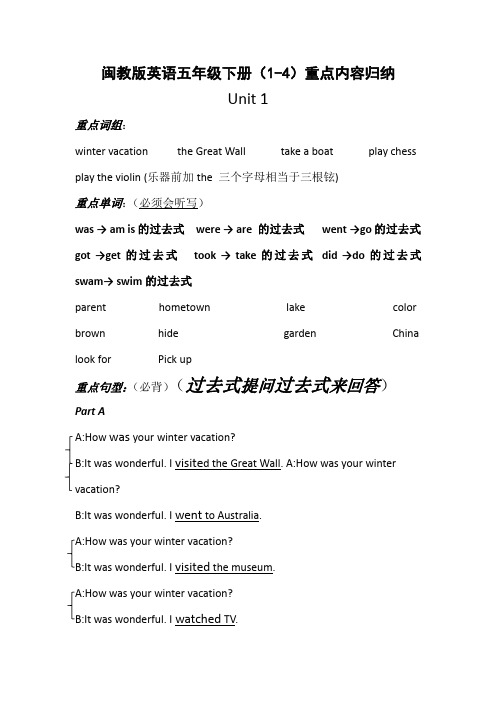
闽教版英语五年级下册(1-4)重点内容归纳Unit1重点词组:winter vacation the Great Wall take a boat play chess play the violin(乐器前加the三个字母相当于三根铉)重点单词:(必须会听写)was→am is的过去式were→are的过去式went→go的过去式got→get的过去式took→take的过去式did→do的过去式swam→swim的过去式parent hometown lake color brown hide garden China look for Pick up重点句型:(必背)(过去式提问过去式来回答)Part AA:How was your winter vacation?B:It was wonderful.I visite d the Great Wall.A:How was your winter vacation?B:It was wonderful.I went to Australia.A:How was your winter vacation?B:It was wonderful.I visited the museum.A:How was your winter vacation?B:It was wonderful.I watched TV.Part BA:How was your winter vacation?B:I went to Taiwan with my parents.A:How was your winter vacation?B:I played the violin.A:How was your winter vacation?B:I played chess with my dad.A:How was your winter vacation?B:I did my homework.Unit2重点词组:want to do over there go straight turn right take a photo of 重点单词:(必须会听写)elephant map hill animal hungry 方位词:under beside next tosaw→see的过去式ate→eat的过去式重点句型:(必背)Part A结构:there is+可数名词单数表示“”There are+可数名词复数①There is a map over there.②There is a baby elephant in the zoo.is③There are some bears under the tree.④There are some tigers next to the lions.Part BA:What animals did you see?B:We saw tigers and elephants.A:Did you take any photos?B:Yes,I took some photos.Unit3重点词组:color the egg here you are in the gardenlook forpick uphave a good time重点单词:(必须会听写)colorbrownhidegardenlook forpick upgot →get 的过去式重点句型:(必背)Part A结构:be+going to do (动词原形)be +doing (用动词的-ing 形式)①I’m going to color the eggs.②I’m going to hide the eggs.am are表示:“”表示:“”③She is going to do her homework.④They are going to skate.Part B①She is going to hide the eggs.②She is hiding the eggs.③They are going to look for the eggs.④They are looking for the eggs.Unit4重点词组:spring outing go for a spring outing get on climb a mountain take sth with sb sports shoes shout to sb the top of the mountain 重点单词:(必须会听写)climb water thirsty camera sky cloud重点句型:(必背)(横线上会替换)Part AA:What are you going to take with you?B:I’m going to take some water with me.A:What are you going to take with you?B:I’m going to take some tea with me.A:What are you going to take with you?B:I’m going to take some fruits with me.A:Whatare you going to take with you ?B:I’m going to take a camera with me.Part B①They are going to get on the bus.②Now they are ③Miss Gao is ④Now she is taking a photo of her pupils.Unit 5重点单词:1.Sports Day2.meter3.long jump4.high jump5.proud重点词组:have a Sports Day run 100-meter race do long jump do high jump take photos for sb (某人)be good at it be not good at itbe proud of sbfall downtry to do well重点句型:Who will do run 100meters ?I will.Who will do long jump ?I will.Who will do high jump ?I will.Peter is running 100meters.He is running very fast.“come on ,Peter!”Lily is shouting.take 要去掉e ,再加-ingYang Ming is doing high jump.He is falling down.Sally is very busy.She is taking photos.Unit6重点单词:1.first2.second3.third4.drink5.tired6.sad7.fourth8.angry重点词组:the winner of drink some water sit under the tree look sad look tired do well in cheer up重点句型:Who is the first in100-meter race?Peter is the first.Who is the second in100-meter race?Wang Ming is the second.Who is the third in100-meter race?Li Hua is the third.We’re proud of you.I didn’t do well in high jump.重点单词:1.floor2.twelfth3.living room4.bridge5.fifteenth重点词组:go home live in live on+come for a visiton the+序数词+floor under the bridge on the bridgelive in that building重点句型:Which floor do you live on?On the twelfth floor.Which floor does he live on?On the fifteenth floor.重点知识:序数词1st first8th eighth15th fifteenth 2nd second9th ninth16th sixteenth 3rd third10th tenth17th seventeenth 4th fourth11th eleventh18th eighteenth 5th fifth12th twelfth19th nineteenth 6th sixth13th thirteenth20th twentieth 7th seventh14th fourteenth重点单词:1.date2.lucky3.Mrs.重点词组:It’s easy to do sth It’s difficult to do sth on the calendar busy doing sth want to do sth busy with sth 重点句型:What’s the date today?It’s April23.January1is New Year’s Day.June1is Children’s Day.September10is Teachers’Day.December25is Christmas Day.重点知识:月份后面的日期读作:the+序数词New Year's Day January1Women's Day March8May Day May1Children's Day June1Teachers'Day September10Christmas Day December25月份缩写January July February August March September April October May November June December。
闽教版小学英语五年级下册知识点

闽教版小学英语五年级下册知识点Unit 1单词与词组was am,is 得过去式were are 得过去式China 中国went go得过去式parent 父,母;家长hometown 故乡took take 得过去式tour 旅行;旅游Sun Moon Lake 日月潭lake 湖did do得过去式swam swim得过去式take a boat tour 乘船游览重点句型与语法How was your winter vacation? 您得寒假过得如何?It was wonderful、I visited the Great Wall、好极了,我参观了长城。
was 就是is 得过去式。
动词得过去式分规则与不规则动词规则动词一般在动词原形末尾直接加上-ed。
如:look-- looked, visit--visited, watch--watched以不发音得字母e结尾得动词,只需加-d。
如:live--lived。
末尾只有一个辅音字母得重读闭音节,先双写这个辅音字母,再加-ed。
如:stop--stopped。
末尾就是辅音字母+y 结尾得动词,先改y为i,然后再加上-ed。
如:study--studied。
不规则动词得过去式需要记忆。
如:am/is--was, are--were, go--went,come--came,take--took,have(has)--had、How about you ? Were you in China?您呢?您在中国吗?No, I wasn’t、I went to Australia、不,我不在中国。
我去了澳大利亚。
How was the weather there? 那里得天气如何?It was hot、It was summer there、那里天气很热,就是夏天。
I went to Taiwan with my parents、我与父母一起去了台湾。
闽教版小学英语五年级下册知识点(1)
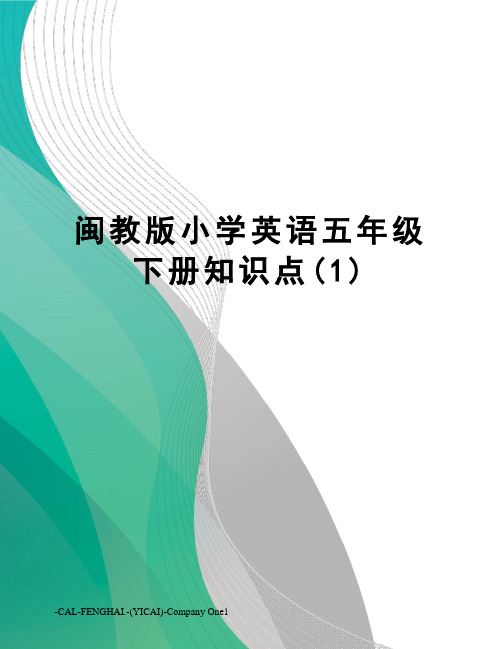
闽教版小学英语五年级下册知识点(1)-CAL-FENGHAI.-(YICAI)-Company One1闽教版小学英语五年级下册知识点Unit 1一.单词与词组was am,is 的过去式 were are 的过去式 China 中国went go的过去式 parent 父,母;家长 hometown 故乡took take 的过去式 tour 旅行;旅游 Sun Moon Lake 日月潭lake 湖 did do的过去式 swam swim的过去式take a boat tour 乘船游览二.重点句型与语法1. How was your winter vacation你的寒假过得如何?2.It was wonderful. I visited the Great Wall. 好极了,我参观了长城。
注:was 是is 的过去式。
*动词的过去式分规则和不规则动词(1)规则动词:一般在动词原形末尾直接加上-ed。
如: look-- looked, visit--visited, watch--watched以不发音的字母e结尾的动词,只需加-d。
如:live--lived。
(2)不规则动词的过去式需要记忆。
如:am/is--was, are--were, go--went, come--came, take--took, have(has)--had.3.How about you Were you in China 你呢?你在中国吗?4.No, I wasn’t. I went to Australia. 不,我不在中国。
我去了澳大利亚。
5.How was the weather there那里的天气如何?6.It was hot. It was summer there. 那里天气很热,是夏天。
7.I went to Taiwan with my parents. 我和父母一起去了台湾。
(with 介词,意思是和,跟,随着)8.Is it your hometown台湾是你的故乡吗?9.Yes, it is. 是的,是我的故乡。
闽教版小学英语五年级下册知识点

闽教版小学英语五年级下册知识点Unit 1单词与词组was am,is 的过去式were are 的过去式China 中国went go的过去式parent 父,母;家长hometown 故乡took take 的过去式tour 旅行;旅游Sun Moon Lake 日月潭lake 湖did do的过去式swam swim的过去式take a boat tour 乘船游览重点句型与语法How was your winter vacation? 你的寒假过得如何?It was wonderful. I visited the Great Wall. 好极了,我参观了长城。
was 是is 的过去式。
动词的过去式分规则和不规则动词规则动词一般在动词原形末尾直接加上-ed。
如:look-- looked, visit--visited, watch--watched以不发音的字母e结尾的动词,只需加-d。
如:live--lived。
末尾只有一个辅音字母的重读闭音节,先双写这个辅音字母,再加-ed。
如:stop--stopped。
末尾是辅音字母+y 结尾的动词,先改y为i,然后再加上-ed。
如:study--studied。
不规则动词的过去式需要记忆。
如:am/is--was, are--were, go--went,come--came,take--took,have(has)--had.How about you ? Were you in China?你呢?你在中国吗?No, I wasn’t. I went to Australia. 不,我不在中国。
我去了澳大利亚。
How was the weather there? 那里的天气如何?It was hot. It was summer there. 那里天气很热,是夏天。
I went to Taiwan with my parents. 我和父母一起去了台湾。
闽教版小学英语五年级下册知识点(1)
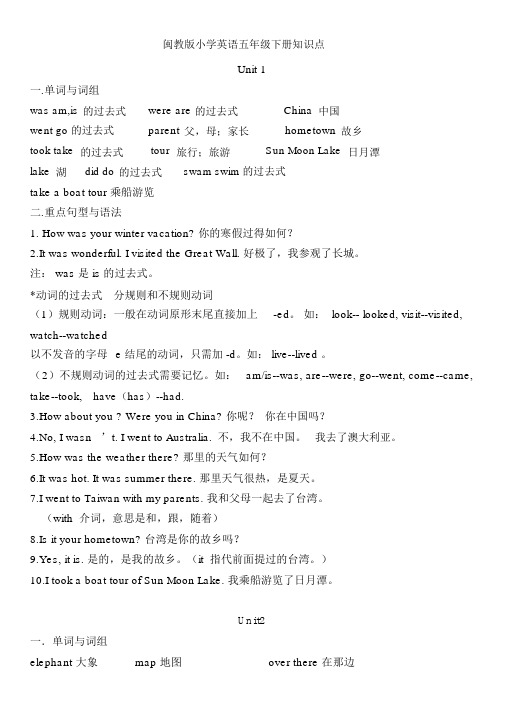
闽教版小学英语五年级下册知识点Unit 1一.单词与词组was am,is的过去式were are的过去式China中国went go 的过去式parent父,母;家长hometown故乡took take的过去式tour旅行;旅游Sun Moon Lake日月潭lake湖did do的过去式swam swim 的过去式take a boat tour 乘船游览二.重点句型与语法1. How was your winter vacation? 你的寒假过得如何?2.It was wonderful. I visited the Great Wall. 好极了,我参观了长城。
注: was 是 is 的过去式。
*动词的过去式分规则和不规则动词(1)规则动词:一般在动词原形末尾直接加上-ed。
如: look-- looked, visit--visited, watch--watched以不发音的字母 e 结尾的动词,只需加 -d。
如: live--lived 。
(2)不规则动词的过去式需要记忆。
如: am/is--was, are--were, go--went, come--came, take--took,have(has)--had.3.How about you ? Were you in China? 你呢?你在中国吗?4.No, I wasn’t. I went to Australia.不,我不在中国。
我去了澳大利亚。
5.How was the weather there? 那里的天气如何?6.It was hot. It was summer there. 那里天气很热,是夏天。
7.I went to Taiwan with my parents. 我和父母一起去了台湾。
(with 介词,意思是和,跟,随着)8.Is it your hometown? 台湾是你的故乡吗?9.Yes, it is. 是的,是我的故乡。
闽教版小学英语五年级下册知识点教案资料

闽教版小学英语五年级下册知识点闽教版小学英语五年级下册知识点Unit 1重点句型与语法How was your winter vacation? 你的寒假过得如何?It was wonderful. I visited the Great Wall. 好极了,我参观了长城。
was 是is 的过去式。
动词的过去式分规则和不规则动词规则动词一般在动词原形末尾直接加上-ed。
如:look-- looked, visit--visited, watch--watched以不发音的字母e结尾的动词,只需加-d。
如:live--lived。
末尾只有一个辅音字母的重读闭音节,先双写这个辅音字母,再加-ed。
如:stop--stopped。
末尾是辅音字母+y 结尾的动词,先改y为i,然后再加上-ed。
如:study--studied。
不规则动词的过去式需要记忆。
如:am/is--was, are--were, go--went,come--came,take--took,have(has)--had.How about you ? Were you in China?你呢?你在中国吗?No, I wasn’t. I went to Australia. 不,我不在中国。
我去了澳大利亚。
How was the weather there? 那里的天气如何?It was hot. It was summer there. 那里天气很热,是夏天。
I went to Taiwan with my parents. 我和父母一起去了台湾。
with 介词,意思是和,跟,随着Is it your hometown? 台湾是你的故乡吗?Yes, it is. 是的,是我的故乡。
it 指代前面提过的台湾。
I took a boat tour of Sun Moon Lake. 我乘船游览了日月潭。
Unit2重点句型与语法Look, there is a map over there. 瞧那边有一幅地图。
闽教版小学英语五年级下册知识点(1)

闽教版小学英语五年级下册知识点(1)Unit 1一.单词与词组was am,is 的过去式 were are 的过去式 China 中国went go的过去式 parent 父,母;家长 hometown 故乡took take 的过去式 tour 旅行;旅游 Sun Moon Lake 日月潭lake 湖 did do的过去式 swam swim的过去式take a boat tour 乘船游览二.重点句型与语法1. How was your winter vacation? 你的寒假过得如何?2.It was wonderful. I visited the Great Wall. 好极了,我参观了长城。
注:was 是is 的过去式。
*动词的过去式分规则和不规则动词(1)规则动词:一般在动词原形末尾直接加上-ed。
如: look-- looked, visit--visited, watch--watched以不发音的字母e结尾的动词,只需加-d。
如:live--lived。
(2)不规则动词的过去式需要记忆。
如:am/is--was, are--were, go--went, take--took, have(has)--had.3.How about you ? Were you in China? 你呢?你在中国吗?4.No, I wasn’t. I went to Australia. 不,我不在中国。
我去了澳大利亚。
5.How was the weather there? 那里的天气如何?6.It was hot. It was summer there. 那里天气很热,是夏天。
7.I went to Taiwan with my parents. 我和父母一起去了台湾。
(with 介词,意思是和,跟,随着)8.Is it your hometown? 台湾是你的故乡吗?9.Yes, it is. 是的,是我的故乡。
闽教版五年级下册Unit 1知识点

五下 uint 1知识点语法:动词的过去式分规则和不规则动词A、规则动词:规则一:一般在动词原形末尾直接加上-ed。
如:look-- looked, visit--visited, watch—watched规则二:以不发音的字母e结尾的动词,只需加-d。
如:live--lived。
规则三:末尾只有一个辅音字母的重读闭音节,先双写这个辅音字母,再加-ed。
如:stop--stopped。
规则四:末尾是辅音字母+y 结尾的动词,先改y为i,然后再加上-ed。
如:study--studied。
B、不规则动词:不规则动词的过去式需要记忆。
如:am/is--was, are--were, go--went, come--came,take--took,have(has)--had.规则动词的过去式:2、词组与短语词组词义词组词义take a boat tour 乘船游览the Great Wall 长城take a __ tour of __ 乘什么游览哪里Sun Moon Lake 日月潭With my parents 和我的父母very often 很经常winter vacation 寒假watch TV 看电视Summer vacation 暑假visited the museum 参观博物馆do my homework 做家庭作业go to Taiwan 去台湾play the violin 拉小提琴play with me 和我一起玩play football 踢足球the Spring Festival 春节play chess 下象棋take a bus 乘公交车(放句中)swim in the sea 在海里游泳by bus 乘公交车(句末)a map of China 一张中国地图3、常用地点:台北 101大楼日月潭北京长城Taipei 101 building Sun Moon Lake Beijing the Great Wall上海逛庙会(fair) 西湖博物馆Shanghai go to the fair West Lake Museum中国澳大利亚美国英国China Australia America UKAustralia5.重要句型1、take a ...... tour of …I took a boat tour of Sun Moon Lake.我乘船游览了日月潭。
闽教版小学英语五年级下册各单元语法知识点
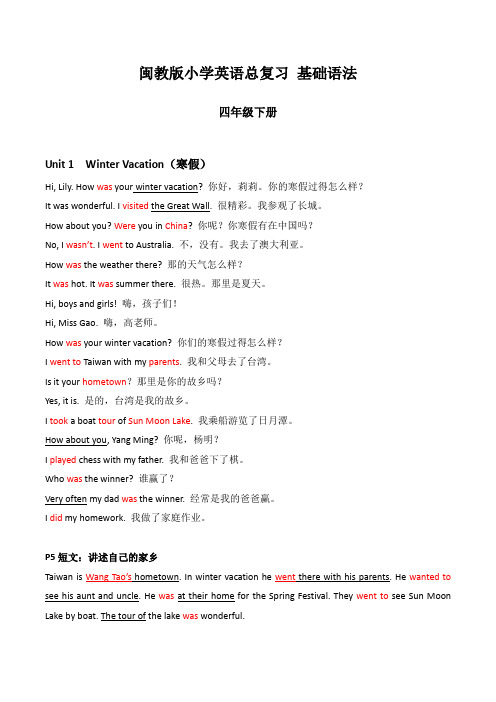
闽教版小学英语总复习基础语法四年级下册Unit 1 Winter Vacation(寒假)Hi, Lily. How was your winter vacation? 你好,莉莉。
你的寒假过得怎么样?It was wonderful. I visited the Great Wall. 很精彩。
我参观了长城。
How about you? Were you in China? 你呢?你寒假有在中国吗?No, I wasn’t. I went to Australia. 不,没有。
我去了澳大利亚。
How was the weather there? 那的天气怎么样?It was hot. It was summer there. 很热。
那里是夏天。
Hi, boys and girls! 嗨,孩子们!Hi, Miss Gao. 嗨,高老师。
How was your winter vacation? 你们的寒假过得怎么样?I went to Taiwan with my parents. 我和父母去了台湾。
Is it your hometown?那里是你的故乡吗?Yes, it is. 是的,台湾是我的故乡。
I took a boat tour of Sun Moon Lake. 我乘船游览了日月潭。
How about you, Yang Ming? 你呢,杨明?I played chess with my father. 我和爸爸下了棋。
Who was the winner? 谁赢了?Very often my dad was the winner. 经常是我的爸爸赢。
I did my homework. 我做了家庭作业。
P5短文:讲述自己的家乡Taiwan is Wang Tao’s hometown. In winter vacation he went there with his parents. He wanted to see his aunt and uncle. He was at their home for the Spring Festival. They went to see Sun Moon Lake by boat. The tour of the lake was wonderful.台湾是王涛的家乡,在寒假他会和父母回台湾。
- 1、下载文档前请自行甄别文档内容的完整性,平台不提供额外的编辑、内容补充、找答案等附加服务。
- 2、"仅部分预览"的文档,不可在线预览部分如存在完整性等问题,可反馈申请退款(可完整预览的文档不适用该条件!)。
- 3、如文档侵犯您的权益,请联系客服反馈,我们会尽快为您处理(人工客服工作时间:9:00-18:30)。
闽教版小学英语五年级下册知识点Unit 1单词与词组was am,is 的过去式were are 的过去式China 中国went go的过去式parent 父,母;家长hometown 故乡took take 的过去式tour 旅行;旅游Sun Moon Lake 日月潭lake 湖did do的过去式swam swim的过去式take a boat tour 乘船游览重点句型与语法How was your winter vacation? 你的寒假过得如何?It was wonderful. I visited the Great Wall. 好极了,我参观了长城。
was 是is 的过去式。
动词的过去式分规则和不规则动词规则动词一般在动词原形末尾直接加上-ed。
如:look-- looked, visit--visited, watch--watched以不发音的字母e结尾的动词,只需加-d。
如:live--lived。
末尾只有一个辅音字母的重读闭音节,先双写这个辅音字母,再加-ed。
如:stop--stopped。
末尾是辅音字母+y 结尾的动词,先改y为i,然后再加上-ed。
如:study--studied。
不规则动词的过去式需要记忆。
如:am/is--was, are--were, go--went,come--came,take--took,have(has)--had.How about you ? Were you in China?你呢?你在中国吗?No, I wasn’t. I went to Australia. 不,我不在中国。
我去了澳大利亚。
How was the weather there? 那里的天气如何?It was hot. It was summer there. 那里天气很热,是夏天。
I went to Taiwan with my parents. 我和父母一起去了台湾。
with 介词,意思是和,跟,随着Is it your hometown? 台湾是你的故乡吗?Yes, it is. 是的,是我的故乡。
it 指代前面提过的台湾。
I took a boat tour of Sun Moon Lake. 我乘船游览了日月潭。
Unit2单词与词组elephant 大象map 地图over there 在那边hill 小山under 在……下面next to 紧挨着animal 动物saw see的过去式hungry 饿的ate eat的过去式any 任何的;若干重点句型与语法Look, there is a map over there. 瞧那边有一幅地图。
there be 句型表示的是“某处有(存在)某人或某物”,其结构为There be +名词+地点状语(地点状语也可以放在句首)。
主语是单数名词或不可数名词时用there is ,主语是名词的复数形式时用there are 如:There is a baby elephant in the zoo. 动物园里有一只小象。
There are some bears under tree. 树下有几只熊。
There are some elephants behind the hill. 小山后面有几只大象。
Let me take a photo of it. 让我来给它拍一张照片。
There are some tigers next to the lions. 紧挨着狮子园有几只老虎。
Next to 紧挨着What animals did you see, children? 你们看到了什么动物?We saw pandas, tigers, monkeys……我们看到了熊猫,老虎,猴子特殊疑问句,用助动词do,did来提问,谓语动词用原形。
Did you give bananas to the monkeys? 你们喂猴子吃香蕉了吗?No, we didn’t. 不,我们没有。
一般疑问句及其否定回答。
We are hungry. We ate the bananas. 我们很饿,我们吃了香蕉。
Unit3单词与词组Easter 复活节color 上颜色color the eggs 给蛋上颜色brown 棕色的hide 藏garden 花园look for 寻找pick up 捡起got get的过去式Easter Bunny 复活节小兔子重点句型与语法What are you going to do, Mom? 妈妈,你准备做什么?I’m going to make some Easter Eggs. 我准备做一些复活节彩蛋。
be going to do sth 将要去做某事;打算,计划做某事they look beautiful. 它们看起来很漂亮。
look 系动词。
I’m going to hide them in the garden. 我准备把它们藏在花园里。
They’re looking for Easter eggs. 他们在寻找复活节彩蛋。
Kate is picking up an egg. 凯特正在捡鸡蛋。
Did you have a good time? 你们玩得快乐吗?Yes, we did.是的,我们玩得很快乐。
Unit 4单词与词组spring outing 春游climb 攀爬mountain 山water 水thirsty 渴的camera 照相机sky 天空cloud 云get on 上车shout 喊叫top 顶部at the top of the mountain 在山顶重点句型与语法We are going for a spring outing. 我们将要去春游。
We’re going to climb a mountain.我们打算去爬一座山。
What’re you going to take with you? 你准备带什么去?I’m going to take some water with me. 我打算带点水。
take……with somebody 是随身携带的意思。
Are you going to wear sports shoes?你准备穿运动鞋吗?Now they are climbing the mountain. 现在他们正在爬山。
climb the tree 爬树climb 意思是向上爬Now they are at the top of the mountain. 他们现在在山顶。
at the foot of the mountain 在山脚They got to the foot of the mountain by bus. 他们乘坐公交车到达山脚。
get to 到达get to the train station 到达火车站get home 到家,get there 到那里Unit 5单词与词组Sports Day 运动会meter 米fast 快long jump 跳远try 尝试high jump 跳高proud 自豪的;骄傲的fall down 跌倒;跌下well 好busy 忙的ran run的过去式grass 草重点句型与语法Who will run 100 meters? 谁愿意参加100米短跑比赛?I will. 我愿意。
will 用来表达意愿,一般将来时Great! You can run very fast. 好极了!你跑得很快。
fast 的反义词是slow, 在四年级上册第4单元的A部分学过He is very slow. I can have a sleep.Who will do long jump? How about you, Julia? 谁愿意跳远?茱莉亚,你来跳远好吗?How about you? 用来征求意见I will try. 我来试试吧。
try 是“尝试”的意思。
如:Who will try? 谁愿意来试一试?Let me try. 让我来试一试。
Come on, Peter! Lily is shouting. 彼得,加油!李丽喊道。
Come on 有来吧,快点,加油多种意思。
要根据不同的语言环境来理解它的具体意思,如:Come on, or we will be late for school. 快点,不然我们要迟到了。
Miss Gao is very proud of Peter. 高老师为彼得感到骄傲。
be proud of 是“为……感动骄傲/自豪”的意思。
如:We are proud of China. 我们为中国感到自豪。
He is falling down. 他掉下来了。
She is trying to do well. 她正努力跳好。
Unit 6单词与词组race 赛跑first 第一second 第二third 第三drink 喝tired 疲倦的sad 难过的cheer up 振作起来only 仅仅fourth 第四angry 生气的program 节目句型与语法Who is the winner of 100-meter race? 谁是百米赛跑的获胜者?100-meter 是由数词+名词(单数)组成复合形容词。
a 500-word report 一份500字的报告a ten-pound note 一张10英镑的钞票my four-year-old son 我4岁的儿子Look. Peter is the first. Wang Ming is the second. And Li Hua is the third. 瞧,彼得获得第一名,王明第二名,李华第三名。
序数词前要用theYou’re the winner of 100-meter race. 你是百米赛跑的获胜者。
of 是个介词,有很多含义,在本句表示从属关系,可以解释为……的,也就是“百米赛跑”Are you thirsty? Drink some water. 你渴吗? 喝点水吧。
He looks tired. 他看起来很疲惫。
look 为看起来的意思,I didn’t do well in the high jump. 我跳高没跳好。
do well in 指具体的某件事,be good at 擅长,具备的能力Oh, cheer up! 振作起来I’m only the fourth in the high jump. 我在跳高比赛中仅名列第四。
Not all can be the first. 并非所有的人都能获得第一名。
Unit 7单词与词组building 建筑物floor 楼层twelfth 第十二would 表达较合意愿的做法living room 客厅;起居室bridge 桥also 也really 真的fifteenth 第十五neighbor 邻居river 河grandmother 祖母;外婆grandfather 祖父;外公重点句型与语法Look. I live in that tall building. 瞧,我住在那栋高楼。
